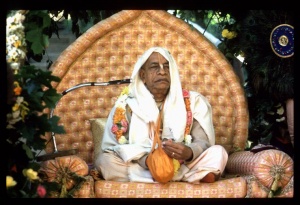CC Madhya 18.197: Difference between revisions
m (1 revision(s)) |
(Vanibot #0054 edit - transform synonyms into clickable links, which search similar occurrences) |
||
| (One intermediate revision by one other user not shown) | |||
| Line 1: | Line 1: | ||
{{ | [[Category:Sri Caitanya-caritamrta - Madhya-lila Chapter 18|C197]] | ||
<div style="float:left">'''[[Sri Caitanya-caritamrta|Śrī Caitanya-caritāmṛta]] - [[CC Madhya|Madhya-līlā]] - [[CC Madhya 18|Chapter 18: Lord Śrī Caitanya Mahāprabhu's Visit to Śrī Vṛndāvana]]'''</div> | |||
<div style="float:right">[[File:Go-previous.png|link=CC Madhya 18.196|Madhya-līlā 18.196]] '''[[CC Madhya 18.196|Madhya-līlā 18.196]] - [[CC Madhya 18.198|Madhya-līlā 18.198]]''' [[File:Go-next.png|link=CC Madhya 18.198|Madhya-līlā 18.198]]</div> | |||
{{CompareVersions|CC|Madhya 18.197|CC 1975|CC 1996}} | |||
{{RandomImage}} | |||
==== TEXT 197 ==== | ==== TEXT 197 ==== | ||
<div | <div class="verse"> | ||
tomāra paṇḍita-sabāra nāhi śāstra-jñāna | :tomāra paṇḍita-sabāra nāhi śāstra-jñāna | ||
pūrvāpara-vidhi-madhye ‘para’—balavān | :pūrvāpara-vidhi-madhye ‘para’—balavān | ||
</div> | </div> | ||
| Line 12: | Line 16: | ||
==== SYNONYMS ==== | ==== SYNONYMS ==== | ||
<div | <div class="synonyms"> | ||
tomāra paṇḍita- | ''[//vanipedia.org/wiki/Special:VaniSearch?s=tomāra&tab=syno_o&ds=1 tomāra] [//vanipedia.org/wiki/Special:VaniSearch?s=paṇḍita&tab=syno_o&ds=1 paṇḍita]-[//vanipedia.org/wiki/Special:VaniSearch?s=sabāra&tab=syno_o&ds=1 sabāra]'' — of the learned scholars of your community; ''[//vanipedia.org/wiki/Special:VaniSearch?s=nāhi&tab=syno_o&ds=1 nāhi]'' — there is not; ''[//vanipedia.org/wiki/Special:VaniSearch?s=śāstra&tab=syno_o&ds=1 śāstra]-[//vanipedia.org/wiki/Special:VaniSearch?s=jñāna&tab=syno_o&ds=1 jñāna]'' — knowledge of revealed scripture; ''[//vanipedia.org/wiki/Special:VaniSearch?s=pūrva&tab=syno_o&ds=1 pūrva]-[//vanipedia.org/wiki/Special:VaniSearch?s=apara&tab=syno_o&ds=1 apara]'' — former and latter; ''[//vanipedia.org/wiki/Special:VaniSearch?s=vidhi&tab=syno_o&ds=1 vidhi]'' — regulative principles; ''[//vanipedia.org/wiki/Special:VaniSearch?s=madhye&tab=syno_o&ds=1 madhye]'' — among; ''[//vanipedia.org/wiki/Special:VaniSearch?s=para&tab=syno_o&ds=1 para]'' — the conclusion at the end; ''[//vanipedia.org/wiki/Special:VaniSearch?s=balavān&tab=syno_o&ds=1 balavān]'' — most powerful. | ||
</div> | </div> | ||
| Line 19: | Line 23: | ||
==== TRANSLATION ==== | ==== TRANSLATION ==== | ||
<div | <div class="translation"> | ||
“The scholars of the Koran are not very advanced in knowledge. Although there are many methods prescribed, they do not know that the ultimate conclusion should be considered the most powerful. | “The scholars of the Koran are not very advanced in knowledge. Although there are many methods prescribed, they do not know that the ultimate conclusion should be considered the most powerful. | ||
</div> | </div> | ||
__NOTOC__ | |||
<div style="float:right; clear:both;">[[File:Go-previous.png|link=CC Madhya 18.196|Madhya-līlā 18.196]] '''[[CC Madhya 18.196|Madhya-līlā 18.196]] - [[CC Madhya 18.198|Madhya-līlā 18.198]]''' [[File:Go-next.png|link=CC Madhya 18.198|Madhya-līlā 18.198]]</div> | |||
__NOTOC__ | |||
__NOEDITSECTION__ | |||
Latest revision as of 22:20, 19 February 2024
Śrī Caitanya-caritāmṛta - Madhya-līlā - Chapter 18: Lord Śrī Caitanya Mahāprabhu's Visit to Śrī Vṛndāvana

His Divine Grace
A.C. Bhaktivedanta Swami Prabhupada
A.C. Bhaktivedanta Swami Prabhupada
TEXT 197
- tomāra paṇḍita-sabāra nāhi śāstra-jñāna
- pūrvāpara-vidhi-madhye ‘para’—balavān
SYNONYMS
tomāra paṇḍita-sabāra — of the learned scholars of your community; nāhi — there is not; śāstra-jñāna — knowledge of revealed scripture; pūrva-apara — former and latter; vidhi — regulative principles; madhye — among; para — the conclusion at the end; balavān — most powerful.
TRANSLATION
“The scholars of the Koran are not very advanced in knowledge. Although there are many methods prescribed, they do not know that the ultimate conclusion should be considered the most powerful.